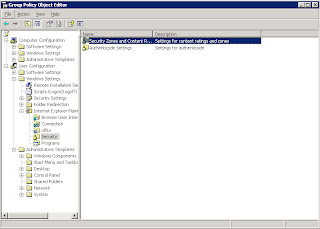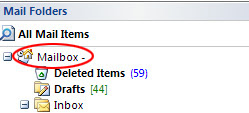To get the classic XP style login where the user must input their username and password every time, some settings can be changed in the Local Security Policy.
Open the Local Security Policy management console. Open Control Panel->Administrative Tools->Local Security Policy. You can also do Start->Run->secpol.msc
Expand Local Policies->Security Options. Set Interactive Logon: Do not require CTRL-ALT-DEL, and Interactive Logon: Do not display last user name to Enabled.
Reboot.
Technology solutions for Systems Engineers and Admins. Linux, Windows, scripts, and code.
Showing posts with label Microsoft. Show all posts
Showing posts with label Microsoft. Show all posts
Friday, September 25, 2009
Sunday, February 1, 2009
Enable Remote Desktop Remotely

Need to remotely enable RDP? Checkout Intelliadmin's RDP Remote Enabler. This program is seriously cool and works every time.
Download it here
Labels:
Microsoft,
RDP,
Remote Desktop,
Windows
Tuesday, December 2, 2008
Links in Outlook: This operation has been canceled due to restrictions in effect on this computer. Please contact your system administrator.
If you get the following message when clicking links in Outlook:
"This operation has been canceled due to restrictions in effect on this computer. Please contact your system administrator."
This is caused by an incorrect or corrupted registry key:
The key should read:
Or in the case of Windows XP x64:
"This operation has been canceled due to restrictions in effect on this computer. Please contact your system administrator."
This is caused by an incorrect or corrupted registry key:
HKEY_LOCAL_MACHINE\SOFTWARE\Classes\htmlfile\shell\open\command
The key should read:
"C:\Program Files\Internet Explorer\IEXPLORE.EXE\" -nohome
Or in the case of Windows XP x64:
"C:\Program Files (x86)\Internet Explorer\IEXPLORE.EXE\" -nohome
Friday, September 19, 2008
Manage Internet Explorer Trusted Sites with Group Policy GPO

I manage a ton of computers that all need to use the same website, and they need elevated permissions to do so. A good way to handle this is by creating a GPO that will add the site to their IE trusted sites.
Create a new GPO and navigate to User Configuration->Windows Settings->Internet Explorer Maintenance->Security. From the right pane, open Security Zones and Content Ratings. Select Import the current security zones and privacy settings, then click Modify Settings.
You may get a warning that you are importing settings that are compatible with computers that dont have IE enhanced security enabled. Ignore this and continue, unless you need this policy for terminal server users where IE enhanced security is enabled for normal users on the terminal server.
From here you can modify items such as security levels and trusted sites. If the user already has a list of trusted sites, their list will be merged with yours when the policy is applied. You can also create a GPO to manage the popup blocker here as well.
Labels:
Group Policy,
Internet Explorer,
Microsoft
Thursday, August 30, 2007
Share Outlook Contacts Sub folders
 In Outlook you can only share your main contacts folder by clicking on share my contacts.
In Outlook you can only share your main contacts folder by clicking on share my contacts.To share sub folders, grant permissions on Mailbox at the root of the tree, grant permissions to your main contacts folder, then grant permissions to the appropriate sub folders.
On the client that needs to open the contacts, go to Tools->Email Accounts->View/Change, Ensure the Exchange account is highlighted and click Change. Click More Settings->Advanced Tab->Add, add the mailbox to be opened.
OK/Close your way out of the menus, click File->Open->Other User's Folder, find/enter the appropriate account, change folder to contacts.
You're all set!
OK/Close your way out of the menus, click File->Open->Other User's Folder, find/enter the appropriate account, change folder to contacts.
You're all set!
Subscribe to:
Posts (Atom)